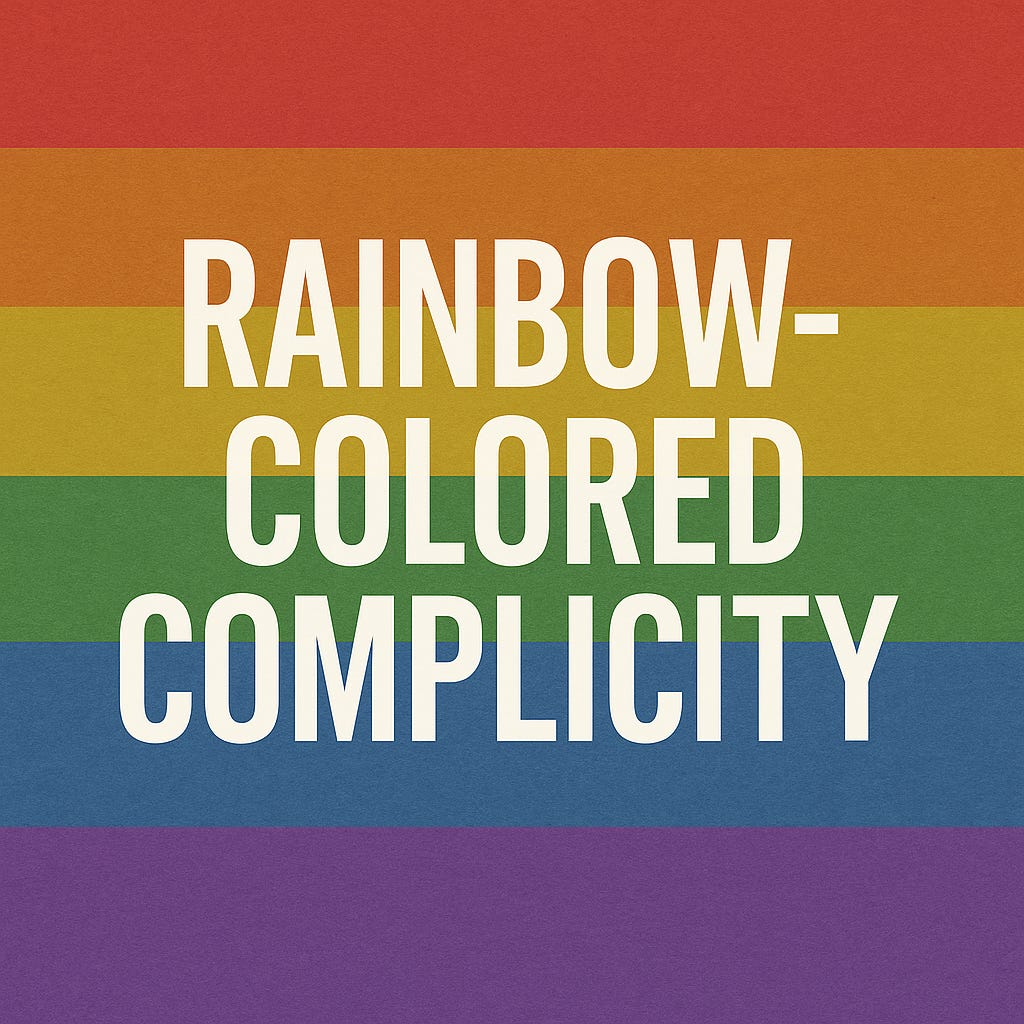Rainbow Colored Complicity
Why straight, already affirming Christians must vote with their feet—today.
It’s often said, and it is true: “Love is not passive. Solidarity costs something.”
Every June, our timelines glow with rainbows. Straight allies hand out hugs, wave flags, and post #LoveIsLove selfies. Many are genuinely committed to queer liberation—until Sunday morning, when they slide back into pews that refuse to bless same-sex love, deny baptism to trans believers, or preach “love the sinner, hate the sin” sermons that still wound.
It’s time to admit the disconnect: we can’t celebrate queer people in the streets while bankrolling churches that harm them from the pulpit.
The toll of non-affirming churches—by the numbers
Mental-health crisis. In The Trevor Project’s 2024 national survey of 18,000 LGBTQ+ youth, 39 % seriously considered suicide in the previous year; the rate climbed to 46 % among trans and non-binary youth. Restrictive or hostile religious settings were a key stressor.
Religious rejection hurts. Peer-reviewed research shows that non-affirming theology correlates with higher psychological distress, lower self-esteem, and increased health-risk behaviors for LGBTQ+ Christians.
Spiritual exile. About 29 % of LGBTQ adults say they’ve been made to feel unwelcome in a place of worship; one-third of those who remain religious report an internal conflict between faith and identity.
The power of affirmation. When queer youth experience high family or community support, suicide-attempt rates drop by half compared with those who face rejection.
These aren’t abstract figures; they are lives—fragile, beloved, and too often pushed to the brink by pulpits that preach exclusion, either actively or passively.
“But I love the music…”
Let’s be honest about the reasons we stay: the soaring worship band, the kids’ program, our friend group, nostalgia. Those comforts are real—and so is the harm sustained every Sunday when anti-LGBTQ theology is normalized. Our presence and our tithes keep the lights on.
Choosing solidarity will come at a cost: awkward conversations, the loss of a familiar community, and perhaps being labeled “divisive” (and that’s a kinder version of what you might be called). Yet the gospel cost has always been picking up a cross, not picking out a worship playlist.
I was a pastor in a non-affirming church that I founded. Changing wasn’t easy. I lost social capital. I lost relationships I had nurtured for years. Some questioned my call. Others quietly backed away. Hundreds simply ghosted me.
But I have never regretted it.
The Spirit didn’t just lead me out—it led me into something deeper, truer, and freer. Into a faith where everyone is welcome to Christ’s table. Into a ministry that aligns with the Jesus I believe in—the one who never asked anyone to shrink themselves to be worthy of love.
A word to the Nicodemus-at-midnight pastors
You call. You text. You tell me you’re affirming, but quiet. You’re scared of the fallout. I hear you. I’ve been you. I will always listen and encourage when you call.
But here’s the hard truth: your silence won’t save anyone else. It might keep you safe for a while, but it doesn’t save queer kids sitting in your pews wondering if they’re an abomination. It doesn’t save the closeted teen praying the gay away. It doesn’t save the trans congregant slowly disappearing under your church’s “we welcome everyone” veneer.
Come out. Speak up. We’ll be here when you do.
What voting with your feet can look like
Leave—loudly and lovingly. A quiet exit keeps systems intact. Tell leadership why you’re gone, then go in peace.
Divert your tithe. Fund affirming ministries, bail funds for trans youth under attack, or queer-led church plants.1
Form a landing pad. Start a small group or house church for those disillusioned but not done with Jesus.
Stay if you’re called to fight—briefly. If you have influence to shift policy, set a timeline and measurable goals. I like to tell well-meaning people who say they are staying to bring about change: Change without a clock becomes complicity.
You’ll be all right
Walking away can feel like the earth is cracking under your feet. It isn’t. I have found deeper worship, authentic friendships, and a Christ who is infinitely bigger than any worship set list. The arc of liberation is long, but leaving non-affirming spaces yanks it forward.
So, straight allies: pick up your rainbow flag—and your shoes. March right out of the churches that refuse to bless queer bodies, then plant yourself in communities where love doesn’t come with an asterisk. Your feet are a vote. Cast it for life.
Anything less is just rainbow-colored complicity.
The Post Evangelical Collective, Launchpad Partners, The Reformation Project, Q Christian Fellowship. Or join me in specifically supporting organizations that support our Trans siblings who are targeted every day, for example, The Transgender Law Center.



Thanks for this, Fred. I too have gained so much more than I’ve lost, as a pastor and human, by engaging my doubts about the church’s traditional stance towards LGBTQ+ folk. I know people who stay in nonaffirming spaces despite affirming alternatives, including queer folk, for reasons I respect, like truly trying to be change agents. And I know more who seem to stay for, as you say, the comforts of a well-funded, well-established church and friend group. Littles churches like the one I co-pastor can’t offer fancy - we can offer a sense of moral congruity and wholeness, our inner and outer worlds shifting into better alignment!
Thanks Fred. I appreciate the numbers. Helpful. I appreciate your advocacy of behalf of the Queer community.